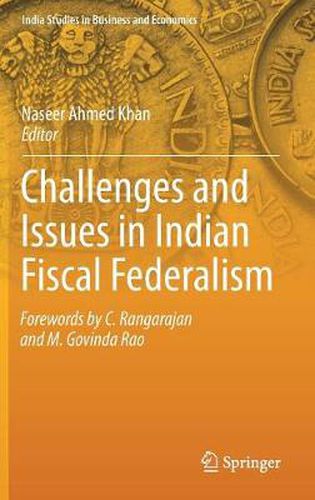Readings Newsletter
Become a Readings Member to make your shopping experience even easier.
Sign in or sign up for free!
You’re not far away from qualifying for FREE standard shipping within Australia
You’ve qualified for FREE standard shipping within Australia
The cart is loading…






This title is printed to order. This book may have been self-published. If so, we cannot guarantee the quality of the content. In the main most books will have gone through the editing process however some may not. We therefore suggest that you be aware of this before ordering this book. If in doubt check either the author or publisher’s details as we are unable to accept any returns unless they are faulty. Please contact us if you have any questions.
This book discusses various dimensions of Indian fiscal federalism, focusing on the current fiscal imbalances - both vertical and horizontal - and their correction. Throwing light on different angles of this subject, it presents well-researched papers, which are divided into three sections. The first section, ‘Fiscal federalism and resolving the fiscal imbalances’, includes five chapters that discuss this theme and also explain the various strategies to remove the existing imbalances in India. ‘Fiscal decentralization for high growth’ which is the second section, explains how decentralisation leads to high economic growth and showcases empirical evidence from a few Indian states that are flourishing due to this policy. The third section, ‘Emerging issues’ offers six chapters describing several existing key concerns in fiscal federalism that have a major impact on achieving India’s development goals. Including contributions from leading academics in this field, the book will be of great interest to research scholars and policy makers alike.
Besides addressing the core issue of fiscal imbalances and ways to correct them, the [chapters] touch on several issues confronting the Indian fiscal system at the centre , state and local levels. The [chapters] are well researched and well argued. The book is a valuable addition to the literature on Fiscal Federalism.
$9.00 standard shipping within Australia
FREE standard shipping within Australia for orders over $100.00
Express & International shipping calculated at checkout
This title is printed to order. This book may have been self-published. If so, we cannot guarantee the quality of the content. In the main most books will have gone through the editing process however some may not. We therefore suggest that you be aware of this before ordering this book. If in doubt check either the author or publisher’s details as we are unable to accept any returns unless they are faulty. Please contact us if you have any questions.
This book discusses various dimensions of Indian fiscal federalism, focusing on the current fiscal imbalances - both vertical and horizontal - and their correction. Throwing light on different angles of this subject, it presents well-researched papers, which are divided into three sections. The first section, ‘Fiscal federalism and resolving the fiscal imbalances’, includes five chapters that discuss this theme and also explain the various strategies to remove the existing imbalances in India. ‘Fiscal decentralization for high growth’ which is the second section, explains how decentralisation leads to high economic growth and showcases empirical evidence from a few Indian states that are flourishing due to this policy. The third section, ‘Emerging issues’ offers six chapters describing several existing key concerns in fiscal federalism that have a major impact on achieving India’s development goals. Including contributions from leading academics in this field, the book will be of great interest to research scholars and policy makers alike.
Besides addressing the core issue of fiscal imbalances and ways to correct them, the [chapters] touch on several issues confronting the Indian fiscal system at the centre , state and local levels. The [chapters] are well researched and well argued. The book is a valuable addition to the literature on Fiscal Federalism.